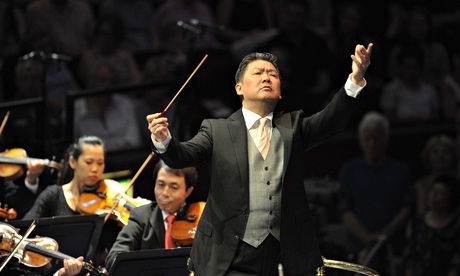
A cloud of dust rose up from the big bass drum as the fateful hammer blows were struck at the end of Mahler's Sixth Symphony. The composer sometimes called this work his "Tragic". It opens in bellicose mood and ends, 70 minutes later, after a minor-chord outburst of despair, falling away to silence. Usually in a live performance – such as this, given by the World Orchestra for Peace conducted by Valery Gergiev – there's an unspoken counting game to see how many seconds pass before that silence erupts in cheers.
At Prom 4, one of the most high-profile concerts of the 2014 BBC Proms season so far, the last note had barely sounded before the applause, warm but not ecstatic, began. The performance was convincing, the players, hand-picked from among the world's best. Was it the heat? Was it the conductor? The matter of Gergiev, who was back five days later with the London Symphony Orchestra, has become thorny. We must address the issue, but not yet.
This was no normal week, globally or musically. The happiest event was the confirmation of Judith Weir as new Master of the Queen's Music. (The suggestion, made by some, that she be called "Mistress", would be like reverting to comedienne or usherette.) She will excel at the job, with dignity and with a generous talent, especially for writing choral music: in the same week she was named associate composer of the BBC Singers.
The other cause for cheer was, of course, the start of the 120th Proms season, which opened with Elgar's The Kingdom (heard on Radio 3). That great Elgarian Andrew Davis, conducting his old band, the BBC Symphony Orchestra, together with the BBC Symphony Chorus and BBC National Chorus of Wales and fine if evidently hot soloists, could hardly be a better advocate for this weighty oratorio. The restrained atmosphere may in part be explained by sadness at the untimely departure of Roger Wright, who officially left his post as controller of the Proms and Radio 3 after the Elgar: our First Night, his last. His successor has not yet been appointed. The musical world is abuzz with names.
This year, a cluster of orchestras from far afield is featured. The first was the China Philharmonic, founded in 2000, with their characterful conductor Long Yu. They had a perfect programme to tickle a British audience, opening with Elgar's Pomp and Circumstance March No 4 and ending with a madcap set of variations on God Save the Queen, which brought the packed house down. Alison Balsom was the eloquent soloist in Joie éternelle, a BBC co-commission by Qigang Chen in which the trumpet starts hesitant and low, eventually swirling up into gleaming virtuosity. One of the new super-breed Chinese pianists, Haochen Zhang, 24, was a dazzling soloist in Liszt's Piano Concerto No 1.
Les Arts Florissants launched the Monday lunchtime Cadogan Hall chamber Proms with a Rameau programme to mark the 250th anniversary of the composer's death. It took a while to hear the contours of these delicate Pièces de clavecin en concerts, for violin, viola, flute and harpsichord, but eventually the zany side of Rameau, a true eccentric, burst through. David Zinman chose London to bid farewell, after 19 years, to his Tonhalle Orchestra Zürich. Glyndebourne triumphed, as did the now celebrated mezzo Tara Erraught, bringing Strauss's Der Rosenkavalier for their annual RAH visit.
Yet the man who dominated the week was Gergiev. His support for Putin has already attracted protests. Many have commented, in language ranging from embarrassment to scorn, on his conducting the World Orchestra for Peace, an occasional ensemble formed by Georg Solti in 1995 to mark the 50th anniversary of the United Nations. The orchestra's other tour dates have been cancelled, it says, because of lack of funding. The players, from Brazil, China, Munich, Riga and beyond, give up their time because they believe in the unifying power of music. They encounter international colleagues for a special one-off concert. No one is paid.
The Albert Hall should have been sold out, but hundreds of seats were empty. Demonstrations were expected. None occurred, though in the nervous atmosphere every groan or persistent cough felt like a protest. The quality of musicianship was clear in Roxanna Panufnik's Three Paths to Peace (2008), a work of sensuous quietude, in which Christian, Jewish and Islamic traditions meet. Strauss's Die Frau ohne Schatten fantasy was gloriously played, as was the Mahler. But all felt subdued. The person who looked most uncomfortable was Gergiev. He must ask himself, with honesty and clarity, how he can best serve his musicians.
At his LSO concert on Thursday, the mood improved. The authority and enduring collegiality of the LSO can withstand most dramas on the podium. Barry Douglas was the accomplished soloist in an otherwise episodic account of Brahms's Piano Concerto No 1. Together with the LSO Chorus, the players let rip magnificently in Janáček's Glagolitic Mass. When they lose one of their own, they play all the harder. The concert was dedicated to Rod Franks, LSO principal trumpeter for two decades, who was killed in a car crash last week. With moving irony, his name was still in the programme as a player.
His musical courage was immense. The trumpet is a high-wire instrument, requires nerves of steel and unwavering musicianship. Mid-career, Franks underwent brain surgery that left him physically impaired as well as deaf in one ear. He once told me he had to relearn how to hear the very sound he was making. It was his own colleagues who told him whether he was hitting the right notes. Watch him, witty and wise, on YouTube giving a masterclass on Mahler's 6th – the 'Tragic" — with Gergiev on febrile top form. Never was the composer's nickname for the work more fitting.
• The BBC Proms continue until 13 September.
• This article was amended on 30 July

